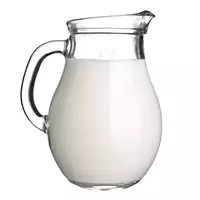Protein milk

Milk is on the list of some of the most popular and widely used foods. In addition, milk plays an important role in the diet of people of all ages. From a scientific point of view, milk is a nutrient liquid and a polydisperse system that contains more than half a hundred biologically active natural compounds that bring tangible flattery to the human body.
Modern food manufacturers can offer consumers a rich range of milk. Moreover, this or that type of product will differ not only in taste and consumer characteristics, but also in nutritional value, as well as in the vitamin and mineral composition of the finished product. It is noteworthy that any type of milk will contain a number of vitamins, as well as minerals and trace elements, which have a favorable effect on the entire human body as a whole.
For example, the composition of the vast majority of milk species contains mineral compounds such as calcium, sodium, magnesium, sulfur, potassium, as well as phosphorus. Milk contains a fairly large amount of selenium, zinc and iodine. However, the unique benefit of milk lies in the content of a specific milk protein and amino acids of natural origin in the product. The most common type of product is considered cow's milk.
Milk has found wide application in the food industry and cooking. On the basis of milk, a number of valuable fermented milk food products are produced. In addition, some varieties of the product, such as protein milk, play an important role in the children's diet. Protein milk can be called unique foods that are used for medical purposes.
Protein milk is understood as a fermented milk product, or rather a mixture that is made, as a rule, from cottage cheese and buttermilk. In turn, buttermilk or buttermilk is a highly fat-free milk that is made in the process of knocking down the oil obtained from their cow's milk. As previously noted, protein milk is not a simple food.
The healing properties of protein milk are manifested in the treatment, as well as the prevention of various diseases of the gastrointestinal tract. Protein milk is considered an excellent natural medicine that is used to feed infants. For the first time, the use of protein milk for the treatment of childhood diarrhea was proposed by Professor L. F. Meyer (Finkel-stein, Meyer).
The first protein milk was made at the beginning of the 20th century in 1910. Nutritionists associate the beginning of a new era in baby nutrition with this date. The new fermented milk product has been successfully used in children's nutrition for more than a hundred years. The chemical composition of protein milk contains a large amount of vitamins of group B, C, H, D, as well as PP. In addition, protein milk is enriched with choline, iron, selenium, molybdenum, calcium and potassium, as well as a number of other naturally useful compounds for the human body.
protein milk 52 kCal
Energy value of protein milk (Ratio of proteins, fats, carbohydrates - ju):
Proteins: 4.3 g (~ 17 kCal)
Fats: 1 g (~ 9 kCal)
Carbohydrates: 6.4 g (~ 26 kCal)
Energy ratio (b | y): 33% | 17% | 49%
 Español
Español Français
Français Português
Português Русский
Русский 简体中文
简体中文 繁體中文
繁體中文 日本語
日本語 한국어
한국어 العربية
العربية Türkçe
Türkçe Қазақ
Қазақ Deutsch
Deutsch Italiano
Italiano Українська
Українська
